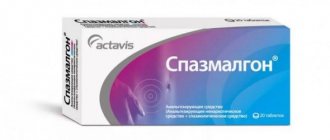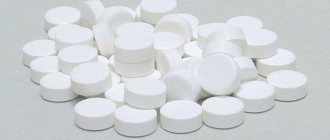- 2019-03-19 11:30:42
- 3643
My relative suffers from symptoms that doctors call “schizophrenia.” These are paranoia, conversations with non-existent people, suspicion, aggressiveness, cognitive rigidity - the inability to respond to changed circumstances. I will tell you everything about this disease.
Author Olga Usem , Ph.D. M.Sc., expert analyst in the field of marketing, business and Russian history, author of more than ten scientific articles (including in English), head of the society “Schizophrenia is not a sentence”, editor-in-chief of the scientific and political newspaper by-by .info.
The first thing you need to know about this disease is that scientists have not yet developed a drug to cure it . You can relieve symptoms by taking antipsychotics - haloperidol (first generation, injections) and risperidone (second generation, injections and tablets).
- The second thing to remember: patients with schizophrenia most often refuse to take antipsychotics because they suffer from side effects - weakness, drowsiness, apathy, foggy consciousness. As a result, the symptoms of the disease return and intensify (relapse).
Based on my experience, I can recommend taking risperidone - this medicine appeared recently, it is modern and has significantly fewer side effects than haloperidol.
What is schizophrenia?
Doctor Husseini Manji
I have already listed the main symptoms of the disease. Let's go into more detail.
- Symptoms of schizophrenia:
- • hallucinations,
- • crazy ideas,
- • paranoia,
- • difficulty concentrating,
- • problems performing basic household tasks.
Doctors have long known that schizophrenia is an error in the functioning of the brain . However, until now the specific mechanisms of this disease were unknown, since the human brain is the most inaccessible human organ to study.
- Today we have partially uncovered some of the mysteries of schizophrenia. In Russia, the EU and the West, scientists have made good progress on this path. Thus, the head of the global therapeutic area “Neurology” at Janssen, doctor Husseini Manji, believes that more effective methods of treating this disease may soon appear.
- “In recent years, we have made very good progress in the study of schizophrenia. We now understand relatively precisely how and why this disease begins. We can say that a revolution is now taking place in this area,”
- says Manji.
Note that it is the creation of new drugs, like risperidone, that shows that scientists are not sitting idle.
Today, almost 2.5 million people suffer from schizophrenia—that’s 1% of the world’s population. This is a very serious disease, it manifests itself in adolescence and at any later age.
In some cases, schizophrenia does not allow people to work, they act in a twilight state, they can get themselves into trouble or end up in prison, and schizophrenics often destroy their relationships due to paranoia and aggressiveness . Another sad symptom of this disease is the tendency to commit suicide, and according to statistics, every tenth person manages to commit suicide.
Schizophrenia, like many other diseases, is a hereditary disease . Therefore, it can be recognized by conducting brain and even DNA studies. Genetic identification of schizophrenia is not yet available, but important research has been conducted over the past 20 years and it has become clear that there are characteristic structural abnormalities in the brain of a person with schizophrenia.
Fixation of a patient with schizophrenia
- After the first onset of symptoms, psychosis or paranoia, the brains of people with schizophrenia had less brain tissue than those of healthy people. Thus, the manifestation of the disease is associated with a decrease in the volume of synapses and neural branches.
Interestingly, at a young age, all people experience a normal loss of “extra” gray matter, but in potential schizophrenics this process can occur too quickly - this leads to psychosis and other symptoms of the disease.
Scientists have now clearly established that those suffering from schizophrenia have less gray and white matter in the brain than normal. As a result, the long myelin-covered brain fibers work less efficiently, leading to various cognitive symptoms. The fact is that these fibers are responsible for the connection between the four lobes of the brain.
Unfortunately, scientists have not yet fully established why some of the gray and white matter decreases . It is now known that inflammation may contribute to this loss.
As a result, immune cells get involved, which can disrupt brain function - synapses and neural branches are destroyed . It is known for sure that infections (severe inflammation) at an early age increase the risk of schizophrenia.
Manifestations of schizophrenia and course of the disease
- Above we have already briefly described the main symptoms of this disease. They can be divided into three parts.
Positive symptoms are hallucinations, delusions, various involuntary actions, swaying, and thought disorders.
Negative symptoms mean the loss of a person’s usual abilities to plan his actions, express his thoughts verbally and in writing - they are similar to laziness and depression.
The third group is cognitive symptoms . The patient cannot concentrate on a specific activity and is quickly distracted. Such symptoms are very difficult to recognize, but they most of all prevent a person from living a normal life.
- Schizophrenia is best recognized by the symptoms of the first group. Hallucinations are hard to miss, as is paranoia. Loss of contact with reality, delusion - all these are the main manifestations of schizophrenia. At the same time, risperidone or other antipsychotics help stop all these problems when they are barely noticeable.
Hallucinations can be varied . The patient may believe that his heart is stopping, that he is suffocating, or that neighbors are deliberately using perfume to “poison” the patient.
The worst thing is when close people come under suspicion . There are cases where a woman with schizophrenia suspected her husband of poisoning and attacked him with a knife. At the same time, it is difficult for ordinary people to react with restraint to schizophrenics.
Patients seem to be aggressive subjects who do not remember anything good, they seem ungrateful, callous and selfish, they do not have positive emotions or are overly emotional. Sometimes schizophrenics are very persistent and demand certain actions, money or things from loved ones.
People close to sick people should react to all such phenomena with restraint; there is no need to call people suffering from illness “schizophrenics”, “sick” or, especially, “crazy” . You need to talk to such people gently and avoid any violence. As a last resort, it is better to call a psychiatric team than to act on your own.
In the hospital, the patient will quickly be brought back to his senses - he will be given the necessary antipsychotics, in the future this will give such a person a chance for a healthy life . In this case, you need to remember the rule that we said above: patients do not want to take antipsychotics. This is due to the fact that such people do not want to consider themselves “crazy,” and voluntary medication use is a tacit admission of their inferiority.
- It is very important that the patient takes medications. He will say that he was “healed”, that he “feels fine anyway,” but you shouldn’t pay attention to his words. Make him take medication - or it will get worse later.
Let's talk about the negative symptoms of schizophrenia.
- Negative symptoms of schizophrenia:
- • flattened affect (fixed facial expression, muttering voice),
- • inability to enjoy life,
- • inability to plan daily activities,
- • scant speech,
- • neglect of hygiene,
- • laziness,
- • depression.
We have already briefly described the cognitive symptoms above. They are the most difficult to detect, and neuropsychological tests are best suited for this purpose.
Schizophrenics do not absorb information well, cannot concentrate on a problem, and remember recently received information less well . As a result, a person cannot cope even with simple work, he quits or is fired. This is why getting disability is not the worst option for such people.
A few words need to be said about one of the most unpleasant symptoms of schizophrenia - aggressiveness . When a person is delirious and paranoid, he cannot be gentle and quiet.
However, most often patients want not to be touched . Most often, patients show aggression towards their loved ones. Wife - addressed to her husband and children, children (read “Giving birth with schizophrenia”) - addressed to parents. There is no need to respond to such aggression.
As a last resort, call an ambulance . Antipsychotics should be taken in the future.
- Note that sometimes schizophrenia appears due to substance abuse. Long-term use of various antidepressants, alcohol or drugs is a direct path to schizophrenics. Such people are the most aggressive because their brain damage is more serious than that of ordinary patients.
Another common manifestation of schizophrenia is suicidal tendencies . The inability to lead a normal life leads to the patient developing a desire to end his life.
In addition, as we said above, one of the symptoms of schizophrenia is depression . 5% of patients with schizophrenia achieve their suicidal goals - most often these are men. In general, schizophrenics are prone to talk about suicide at various stages, and it is better to take this seriously.
What pills are prescribed?
There are currently many medications available to treat schizophrenia. The course of therapy is determined by the doctor based on the patient’s condition. Since the disease is cyclical, the main goal of treatment is to combat attacks and prolong remission.
Schizophrenia cannot be cured using only one group of drugs. This disease requires an integrated approach. Let's consider what drugs can be used in the treatment of schizophrenia.
The medicine is taken daily: once or twice
This is the main group of drugs used for schizophrenia. They are used to prevent psychomotor agitation and reduce emotional disturbances that occur against the background of hallucinations and delusions. Antipsychotics do not affect cognitive function.
Today, there are two types of such funds:
- Typical. They were developed about 70 years ago, but nevertheless continue to be actively used for the treatment of schizophrenia today. This group of drugs should be taken with extreme caution due to the risk of developing multiple side effects. Typical antipsychotics come in two types: strong (attack-stopping) and weak (having a sedative effect).
- Atypical. These medications were created 30 years later than the type of drugs described above. They are more effective and have fewer side effects, and therefore are often used in cases where treatment with typical antipsychotics does not give the expected result.
How is schizophrenia treated in the 21st century?
Risperidone life-giving tablets
We said above that science is now moving forward and, perhaps, drugs will soon appear that will simply restore the white and gray matter in the patient’s head - after which there will be no trace of schizophrenia.
Now this is far from happening . Antipsychotics are still the most reliable treatment. This is not a cure, but a means of relieving symptoms. The most effective medicine of all, common in the post-Soviet space today, is risperidone.
- Let's talk about how we treated it before. In the vast majority of cases, we used haloperidol. This is a first generation drug, invented back in the 60s.
- It causes serious side effects, muscle stiffness, persistent muscle spasms, tremors, restlessness and even neuroleptic syndrome . The last thing is very dangerous, you can read about it on Wikipedia, but it occurs very rarely - and it is more likely to get into an accident than to develop such a syndrome. In addition, we do not recommend that you take outdated drugs such as haloperidol.
In the 90s, second generation drugs were developed . In the post-Soviet space, this generation is represented by risperidone.
These drugs have virtually no serious side effects . However, risperidone causes weight gain and slows down metabolism. Patients can significantly increase body weight - become obese. Perhaps in the future there will be more effective drugs, but now the second generation is the best choice. It's better to be fat than to suffer from schizophrenia - right?
Let's mention a few more second-generation drugs: olanzapine, quetiapine, sertindole and ziprasidone. Note that the production of risperidone is established in Russia and Belarus, so it is cheap, and for those suffering from schizophrenia it is given out free of charge in pharmacies (with a doctor’s prescription).
Other medications have to be purchased abroad - and they are expensive . For example, a dose of the American drug risperidone, which can be administered to a patient for two weeks, costs approximately $100. The advantages of risperidone injections are as follows: this is an original medicine, more effective, it only needs to be administered once every two weeks. When a patient refuses pills, injections can be a good solution to the problem.
Note that patients hate medications . They refuse to accept them because they do not consider themselves “crazy.”
At the same time, the same risperidone returns patients to reality in a matter of days - and has almost no serious side effects . This is a very effective remedy, even delirium goes away in 1-2 weeks. After just a month and a half, the patient practically returns to reality.
- Note that at first, taking antipsychotics may cause drowsiness, dizziness, blurred vision, rapid heartbeat, problems with the menstrual cycle, sensitivity to sunlight or skin rash, but most often these symptoms (read “5 signs of schizophrenia”) disappear after 2 -3 days.
Sometimes a patient may develop depression, in which case you can try taking antidepressants.
You need treatment for many years. You need to come to terms with this.
All you have to do is stop taking the medication and all the symptoms, delirium, aggressiveness, hallucinations will all return . If the task is to stop taking antipsychotics, you need to do this gradually, over a long period of time, for years.
If you take 3 tablets, then you can reduce the dose to 2.5 tablets and take this dose for 2-3 months . Then you can reduce the dose a little more. The meaning is clear: you will have to leave risperidone within a year or even two.
Please note that when reducing the dose, you should keep an eye on the patient . If he begins to show symptoms of schizophrenia, he needs to go back to taking more of the drug.
- DO NOT STOP TAKING THE PILLS ABSOLUTELY. This is a direct path to the Mental Health Center (psychiatric hospital) - to tired, angry orderlies, haloperidol, bad food, lack of freedom and other delights of state free hospitals. However, thank you that in Russia and Belarus everything is free. Would you be willing to pay several thousand dollars for hospitalization? So respect the work (read “The right to work for schizophrenics, epileptics and people with other mental disorders”) of doctors and do not stop taking your medications.
The patient must understand that schizophrenia is something similar to diabetes . And antipsychotics are something similar to insulin. Get used to living with risperidone.
Scientists have found that schizophrenia is most effectively treated at an early stage. After all, all relapses cause serious damage to the brain.
Not to mention the fact that at the moment of admission to the hospital, the patient begins to be injected with haloperidol - a first-generation drug - which in itself causes various problems . Take risperidone and stay healthy.
Classification
Psychotropic drugs without a prescription are medications that have a direct effect on the mental functioning of the brain. Depending on the direction of their action, all drugs in this group are divided into several types. All of them and their characteristics are described in the table below.
| Classification | Characteristic | Drugs |
| Nootropics | These drugs have a direct effect on the functions of the central nervous system, increase the activity of neurons, improve the propagation of nerve impulses, and preserve brain metabolism during a lack of oxygen. | Piracetam, Ginkgo biloba |
| Tranquilizers | These medications are recommended for use when feeling anxious and fearful and have a calming effect. | Elenium, Bromazepam |
| Sedatives | These medications have a suppressive effect on the excited nervous system. | Corvalol, Bromural, Valocordin |
| Neuroleptics | They are recommended to be taken if the patient has a state of psychosis. | Clozapine, Risperidone |
| Antidepressants | They have a sedative effect on anxiety and normalize nervous activity. | Mianserin, Melipramin |










